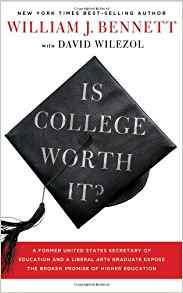Is College Worth It?
Bill Bennett, in his book Is College Worth It?, makes a compelling argument for considering college alternatives and counting the cost when it comes to preparing students for the workforce. Educators, myself included, value education to the degree that college for everyone has become the default for what it means to be successful. Truth is, college may not be the best option for those looking for greater earning power, especially when a degree comes with a high price tag and low to average wages.
There are numerous benefits for attending college and many students are equipped to be successful. For those who are able to receive scholarships, I think it would be a mistake not to go. However, amassing a $50,000 to $150,000 debt, as many students do (for a bachelor’s degree), can be a heavy burden for decades after college for those fields of study where salaries peak at or below $50,000 annually. A two year degree at a community college for a specific skill like nursing, may cost less than $10,000 and provide earnings above what many four year degrees offer. In addition, some students have entrepreneurial skills that may not require a formal degree-think Bill Gates, Dave Thomas, David Green, Rachel Ray, Steve Jobs and others.
I have seen young people get a degree in English, Communications, Journalism and even Business, who are working for less than $12.00 an hour because they are unable to secure a job in their field. At this rate of pay, making a dent in student loans will mean living with parents, or working multiple jobs. The cost of tuition and the quality of the education are things to consider when choosing an institute of higher learning.
Bennett makes a case for avoiding college debt by doing some research in advance. Assess the quality of the education you are seeking with an understanding that high tuition rates do not correlate to superior schooling. Bennett directs readers to PayScale.com to learn more about the return on investment (ROI) for any given college or university and degree earned.
Finances aside, Bennett shares other concerns regarding the culture of colleges and universities, and how America’s youth are being educated.
The purpose of this book is not to debate the efficacy of higher education. Whether you see college primarily as a place to secure a job qualification or a program to shape the human person and cultivate virtue, the reality is that the modern university has proven in many cases indifferent to cultivating the minds and souls of its students. While espousing a rhetoric that proclaims higher education, the seriousness of study and meaningfulness of content itself belie lower impulses and motivations, leaving many students unprepared for life or morally adrift (p. 128).
This book was a fresh reminder of the importance of K-12 education. It is our responsibility as parents and educators, to prepare students to contribute to society and provide for a family. We must recognize that this preparation may or may not result in a four year degree, making the need for rigorous K-12 instruction in both academics and virtues, all the more significant.
How has college and loan debt effected your life? How will it influence the council you give your children? Please share your story.

